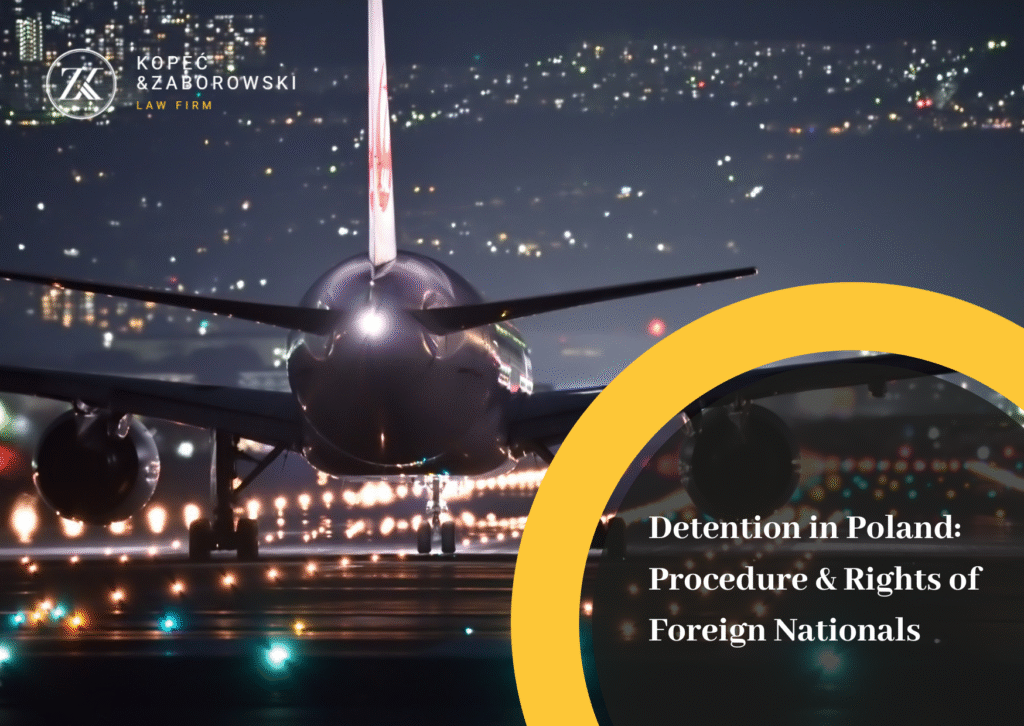

Since 2010, the Global Law Experts annual awards have been celebrating excellence, innovation and performance across the legal communities from around the world.
posted 4 months ago
Being “detained” in Poland means a temporary deprivation of liberty by the Police or other authorities under specific legal grounds. This can happen when there is reasonable suspicion of an offense, to prevent escape or tampering with evidence, or to confirm identity in defined situations. It is different from a simple stop or identity check—those are routine control measures and do not necessarily involve taking you to a station or restricting your movement.
It also differs from pre-trial arrest (tymczasowe aresztowanie), which can only be ordered by a court upon a prosecutor’s motion. Detention is what happens first; pre-trial arrest is a separate judicial decision that may follow in more serious cases.
This guide explains the timeline of detention in Poland and your core rights, with a special focus on what foreign nationals can rely on in practice: access to a lawyer, free interpretation, and consular contact. The aim is to give practical, plain-English steps you can use immediately if you or someone you support is detained in Poland.
Officers may stop you to verify identity, ask basic questions, and assess whether there are grounds to detain you (for example, being caught in the act, strong suspicion of an offense, or concrete risk of escape). A stop alone is not yet detention, but it can quickly escalate if grounds appear.
If detained, you must be told immediately the legal basis and reasons. You should receive a written notice of rights in a language you understand, or through an interpreter if needed. The authorities draw up a detention protocol recording the time, place, grounds, and your requests (e.g., contacting a lawyer or consulate). You can request a copy or extract of these documents.
Police detention can last up to 48 hours from the moment you are actually deprived of liberty (not from when you arrive at the station). If the prosecutor seeks pre-trial arrest, you must be brought before a court, which then has another 24 hours to decide. Practically, that means up to 72 hours from detention to a court’s decision window.
Possible outcomes include: (a) release without charges; (b) release with summons or charges and potential non-custodial measures; or (c) transfer to court for a decision on pre-trial arrest or other preventive measures.
At every stage, you can contact a lawyer, request an interpreter, and ask that your consulate be notified. You can also ask the Police to notify a chosen person (e.g., a family member or employer) about your detention.
If you do not speak Polish sufficiently, you have the right to a free interpreter during all essential stages, including: being informed of your rights, any questioning, the service of key decisions or charges, and court hearings. The point is not formality but real understanding: you should be able to follow what is happening and meaningfully exercise your defense.
The State must translate essential documents to the extent necessary for you to understand the case and defend yourself. Typically this includes the detention decision/protocol, charges, and any court order on pre-trial arrest. Not every document is translated in full; where a summary would impair your understanding, ask your lawyer to request a more complete translation.
If you are deaf, hard of hearing, or have a speech impairment, you are entitled to appropriate communication support (e.g., a sign language interpreter or alternative communication methods). Tell the Police clearly what support you need.
Practical tips:
As a foreign national, you can request that your embassy or consulate be notified of your detention and that you be allowed to speak with a consular officer. Consuls can visit you, check on your treatment, help you understand local procedures, and provide lists of local lawyers. They cannot act as your lawyer, give you legal representation in court, or interfere with judicial decisions.
Dual nationals and stateless persons. If you have dual nationality, you can specify which consulate should be contacted. If you are stateless or otherwise without consular representation, ask about contacting a mission of your state of habitual residence or a protecting power/organization.
Practical tips:
You may retain a lawyer of your choice. If you cannot afford one, ask about legal aid or court-appointed counsel options; your consulate may provide a list of English-speaking lawyers. You can consult a lawyer before questioning (where feasible) and have them present during questioning. If the authorities propose to start without your lawyer, record your request for counsel and ask to postpone questioning unless urgent circumstances require otherwise.
Practical tips:
In stressful moments, short and clear phrases help you assert your rights and create a record:
Collect and keep copies of any documents given to you. If copies are not immediately available, ask for extracts or note document names, dates, and reference numbers. Write down times, officer names / badge numbers, and the requests you made (e.g., lawyer, interpreter, consulate). Stay polite and calm. Do not sign anything you do not understand – ask for translation and / or a lawyer first.
If you have medical needs, say so clearly: “I need my medication” or “I require medical assistance.” If you feel unwell, ask for a doctor; this also creates a record if you later need to document your condition.
If you think your detention was unlawful or irregular, you can file a complaint (zażalenie na zatrzymanie) to the court within 7 days of detention. This is possible even after you have been released. The complaint can address the lawfulness, grounds, and manner of detention, and it can be supported by documents and witness statements.
Inform your lawyer immediately and provide a written account of what happened, including times, names, badge numbers, and any requests you made. Ask the Police for certified copies / extracts of the detention protocol and the rights notice. If relevant, seek an independent medical examination and keep evidence such as photos of injuries or contact details of witnesses.
This article is informational. For tailored advice and representation, consult a qualified Polish criminal defense lawyer. If you are a foreign national, also consider contacting your embassy or consulate for assistance and referrals.
Yes. If you do not speak Polish sufficiently, you can request a free interpreter for essential stages so you understand your situation and can defend yourself.
You can request consular notification and speak with a consular officer. Consulates can assist and monitor your case but do not act as your lawyer.
Ask to consult a lawyer first. In urgent cases, authorities may proceed; document your request, and consult your lawyer as soon as possible.
Up to 48 hours of police detention. If the prosecutor seeks court arrest, the court has 24 hours to decide after you are brought before it.
Yes. If you don’t understand a document, do not sign it. Request an interpreter or a translation first and consult your lawyer.
It can, depending on EU data sharing, local background checks, and the nature of the case. Ask a lawyer about your specific situation.
File a court complaint (zażalenie) within 7 days from detention. Your lawyer can prepare and submit it, even if you were already released.
Quick Checklist
Say: “Interpreter, please.” “I want a lawyer.” “Please notify my consulate.”
Get the written rights notice and keep copies of all documents.
Don’t sign what you don’t understand.
Note times, names, badge numbers, and your requests.
Remember the 48h + 24h rule and ask officers to confirm the exact timing.
Disclaimer & When to Seek Legal Help
Laws and procedures can change. This article provides general information, not legal advice. If you are detained or charged in Poland, contact a qualified Polish criminal defense lawyer immediately. As a foreign national, also consider contacting your embassy or consulate for assistance, welfare checks, and referrals to local counsel.
For expert legal representation in Poland, you may contact Attorney Maciej Zaborowski, a recognized criminal defense lawyer and partner at KKZ Law Firm. Additional resources and legal assistance are available through:
KKZ – Kancelaria Kopeć Zaborowski
Stay informed with the latest legal developments at Global Law Experts
Author


No results available
posted 8 hours ago
posted 11 hours ago
posted 11 hours ago
posted 11 hours ago
posted 11 hours ago
posted 11 hours ago
posted 11 hours ago
posted 1 day ago
No results available
Find the right Legal Expert for your business
Global Law Experts is dedicated to providing exceptional legal services to clients around the world. With a vast network of highly skilled and experienced lawyers, we are committed to delivering innovative and tailored solutions to meet the diverse needs of our clients in various jurisdictions.

Thinking of buying property in Brazil? Start with a full legal safety net.
✔️ Check title and ownership history
✔️ Verify no debts or disputes
✔️ Confirm zoning and permits.
#BrazilProperty #RealEstateInvesting #LegalDueDiligence #ForeignInvestment #PropertyLaw #GlobalRealEstate #InvestmentRisk #BrazilLaw

When your international business faces financial distress, quick action is key! 🔑 Negotiating with creditors, restructuring debt, and understanding insolvency laws can help regain stability. Global Law Experts is here to guide you through your options.
🌍Explore the details on our website.
🔗Link in bio
#GlobalLawExperts #CommercialLaw #BusinessLaw #LegalAdvice #BusinessGrowth #LegalTips #BusinessStrategy #LegalCompliance #Law #LegalKnowledge #LegalAwareness #Law101 #LegalEducation #IntellectualProperty

Thinking of buying property in Brazil? Don’t stop at the contract or key handover. Make sure the title is officially registered before calling it yours.
#BrazilRealEstate #PropertyLaw #GlobalInvestment #ForeignInvestors #LegalTips #DueDiligence #RealEstateRegistration #SecureInvestment

Getting a termination notice right now? Know your rights. Valid reason, fair process, proper notice they matter. Don’t let a bad dismissal walk away without accountability.
#EmploymentLaw #WorkerRights #Termination #LaborLaw #FairDismissal #WorkplaceJustice #LegalAwareness #GlobalWorkforce

Running a business is hard enough — lawsuits shouldn’t make it harder. 🚫 Protect your business with the right legal strategies and expert tools from Global Law Experts. Let’s secure your future together! 💼
🌍Explore the details on our website.
➡️www.globallawexperts.com
#GlobalLawExperts #CommercialLaw #BusinessLaw #LegalAdvice #BusinessGrowth #LegalTips #BusinessStrategy #LegalCompliance #Law #LegalKnowledge #LegalAwareness #Law101 #LegalEducation #IntellectualProperty #Infringed #Ecommerce #LegalBranding
Global Law Experts is dedicated to providing exceptional legal services to clients around the world. With a vast network of highly skilled and experienced lawyers, we are committed to delivering innovative and tailored solutions to meet the diverse needs of our clients in various jurisdictions.

Thinking of buying property in Brazil? Start with a full legal safety net.
✔️ Check title and ownership history
✔️ Verify no debts or disputes
✔️ Confirm zoning and permits.
#BrazilProperty #RealEstateInvesting #LegalDueDiligence #ForeignInvestment #PropertyLaw #GlobalRealEstate #InvestmentRisk #BrazilLaw

When your international business faces financial distress, quick action is key! 🔑 Negotiating with creditors, restructuring debt, and understanding insolvency laws can help regain stability. Global Law Experts is here to guide you through your options.
🌍Explore the details on our website.
🔗Link in bio
#GlobalLawExperts #CommercialLaw #BusinessLaw #LegalAdvice #BusinessGrowth #LegalTips #BusinessStrategy #LegalCompliance #Law #LegalKnowledge #LegalAwareness #Law101 #LegalEducation #IntellectualProperty

Thinking of buying property in Brazil? Don’t stop at the contract or key handover. Make sure the title is officially registered before calling it yours.
#BrazilRealEstate #PropertyLaw #GlobalInvestment #ForeignInvestors #LegalTips #DueDiligence #RealEstateRegistration #SecureInvestment

Getting a termination notice right now? Know your rights. Valid reason, fair process, proper notice they matter. Don’t let a bad dismissal walk away without accountability.
#EmploymentLaw #WorkerRights #Termination #LaborLaw #FairDismissal #WorkplaceJustice #LegalAwareness #GlobalWorkforce

Running a business is hard enough — lawsuits shouldn’t make it harder. 🚫 Protect your business with the right legal strategies and expert tools from Global Law Experts. Let’s secure your future together! 💼
🌍Explore the details on our website.
➡️www.globallawexperts.com
#GlobalLawExperts #CommercialLaw #BusinessLaw #LegalAdvice #BusinessGrowth #LegalTips #BusinessStrategy #LegalCompliance #Law #LegalKnowledge #LegalAwareness #Law101 #LegalEducation #IntellectualProperty #Infringed #Ecommerce #LegalBranding
Send welcome message